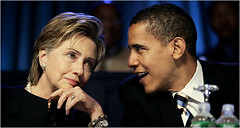|
 | Joe Biden | In 1994, Biden voted against a failed amendment that would have withheld federal funding from schools that deny students the right to voluntary prayer. After President Bush endorsed the teaching of intelligent design alongside evolution, Biden told The News Journal in 2005 that the separation between church and state should not be "messed with." |
|
 | Sam Brownback | Brownback has said America needs to "stop driving God out of the public square." He supports allowing religious expression on public property, including nativity displays. He introduced the Public Expressions of Religion Act, which required "activist groups" to pay their own legal fees when winning cases related to public displays of faith; Brownback said the bill "would prevent local cities and towns from being coerced into settling claims out of a fear of huge monetary losses." Brownback cosponsored the 2005 Constitution Restoration Act, which would have limited the power of federal courts to rule on church-state issues. |
|
 | Hillary Clinton | In a 2005 speech, Clinton said that religious political officials should be able to "live out their faith in the public square." During her 2000 Senate campaign, Clinton argued that allowing teachers to post the Ten Commandments in schools was a violation of the constitution. |
|
 | Christopher Dodd | Dodd has said that the separation of church and state should be understood not as a strict barrier between the two but as a relationship where one can reflect the other. "Faith can influence policy and … state can influence how we allow for the space and tolerance of religious traditions," he said. "I don't think we've done a very good job of connecting those ideas and concepts." Dodd says that while his Catholicism is an important part of his identity, his obligation as a senator is to uphold the law of the land regardless of his personal faith. |
|
 | John Edwards | Edwards says he believes in the separation of church and state, but also thinks that there is a role for faith in public life. He said "freedom of religion doesn't mean freedom from religion," but he "would not, under any circumstances, try to impose [his] personal faith and belief on the rest of the country." |
|
 | Rudolph Giuliani | As mayor, Giuliani emphasized that believers and atheists alike must tolerate each others' views. During his 2000 senate campaign against Hillary Clinton, Giuliani said the Ten Commandments are ''part of Western civilization,'' and ''if teachers want to emphasize what is in it and talk about it, there shouldn't be some kind of inquisition that they can't do that.'' |
|
 | Mike Huckabee | Huckabee has said that his faith "explains" him and affects his decision-making process. He has said: "I'm not as troubled by a person who has a different faith. I'm troubled by a person who tells me their faith doesn't influence their decisions." He has said that the government "should have a hands-off attitude" toward religion, and he has called efforts to ban religious displays on public property "absurd." Huckabee says he believes that the U.S. is "a nation of faith [but] it doesn't necessarily have to be mine." |
|
 | Duncan Hunter | Hunter has clashed with Americans United for the Separation of Church and State and other groups in favor of keeping religion and government separate. In 2006, he was instrumental in enabling the Department of Defense to take ownership of a controversial La Jolla, Calif., hilltop site where versions of a cross have stood for nearly a century. Before the transfer, critics had tried for more than 10 years to remove the Mount Soledad cross from public land. |
|
 | Dennis Kucinich | Kucinich has said that "while our fathers understood well the importance of the separation of church and state, they never meant America to be separate from spiritual values." At the same time, he believes in the separation of church and state and says that federal courts have not gone far enough in requiring the removal of religious symbols from public places. "By removing the trappings of religion from our public schools, courthouses, and other institutions of municipal, state and federal government, we actually increase the freedom of everyone to freely and openly practice the beliefs of their choice," he said. |
|
 | John McCain | McCain favors keeping the words "under God" in the Pledge of Allegiance; he has voted three times in favor of Senate legislation to affirm the reference. During his 2000 presidential campaign, McCain said the nation was founded on "Judeo-Christian values" but added that "political intolerance by any political party is neither a Judeo-Christian nor an American value." |
|
 | Barack Obama | Obama says he believes in the importance of the separation of church and state, but says that a "sense of proportion" should guide how it is enforced. He says that the phrase "under God" in the pledge of allegiance and voluntary student prayer groups on school property are two examples where conflict between church and state has been alleged, but should be less strictly policed. |
|
 | Ron Paul | In a 2003 blog post, Paul wrote that the Founding Fathers "envisioned a robustly Christian yet religiously tolerant America, with churches serving as vital institutions that would eclipse the state in importance." In 2002, Paul introduced legislation that would, in his words, "restore First Amendment protections of religion and speech by removing all religious freedom-related cases from federal district court jurisdiction." Two months after 9/11, Paul was one of only three Republicans to vote against a sense-of-the-Congress resolution encouraging schools to set aside time for prayer or private reflection. |
|
 | Bill Richardson | Richardson was criticized by advocates of the separation of church and state for granting state employees a paid half day off to mark the funeral of Pope John Paul II. Richardson defended his actions, saying that the pope was an important statesman in addition to being a religious leader. While running for governor of New Mexico in 2002, Richardson said that he wouldn't impose his personal views on the government, adding, "A governor should have high moral character; a governor should recognize the separation of church and state." |
|
 | W. Mitt Romney | Romney says the First Amendment does not mean that no religion should be established, or that secularism should be established in place of religion. He also says Judeo-Christian values helped found the United States and continue to influence it today. Romney supports keeping references to God on U.S. money, in the Pledge of Allegiance and in public places to remind Americans of their heritage. |
|
 | Fred Thompson | Thompson has criticized the judiciary for overstepping its bounds and attempting to set "social policy." He wrote that "Many federal judges seem intent on eliminating God from the public schools and the public square in ways that would astound our founding fathers. … They ignore the fact that the founders were protecting the church from the state and not the other way around." |
|




















































































No comments:
Post a Comment